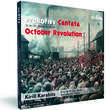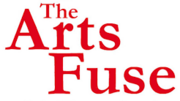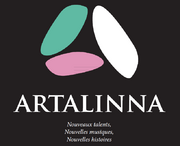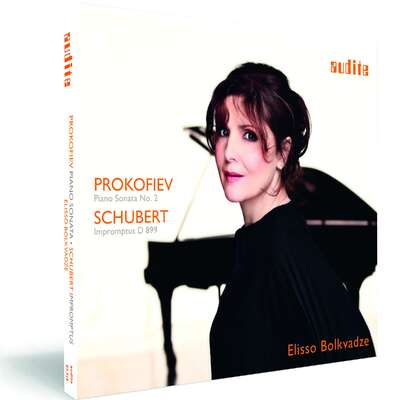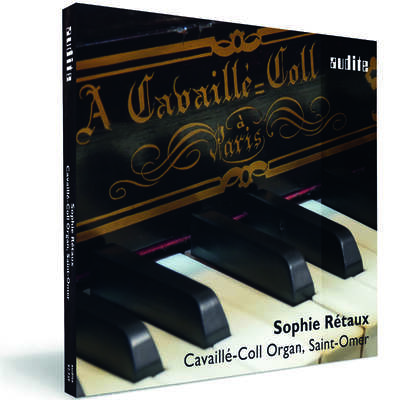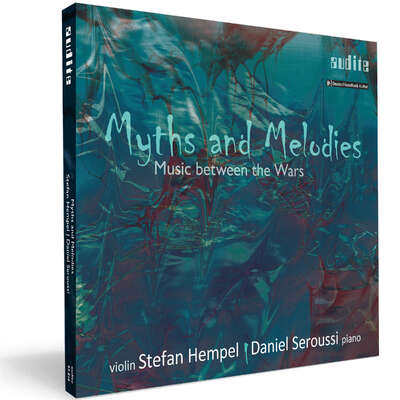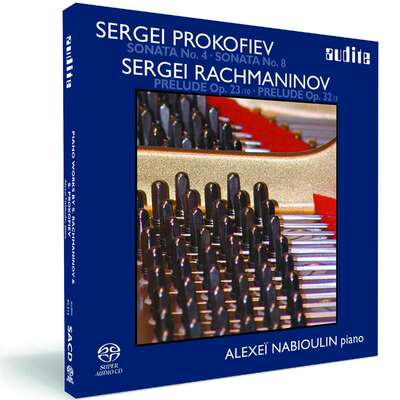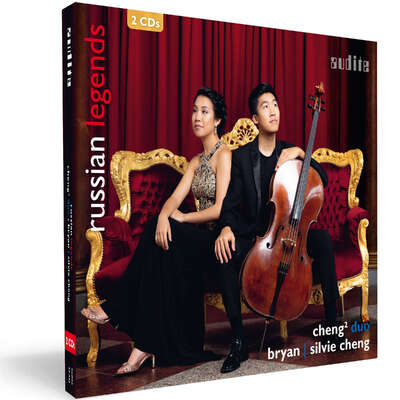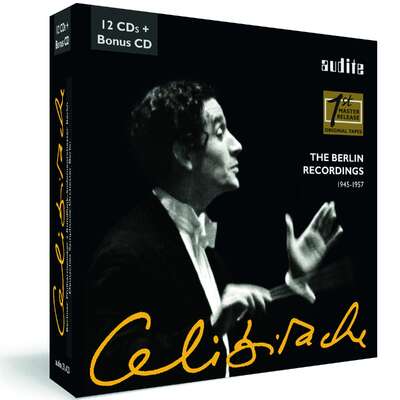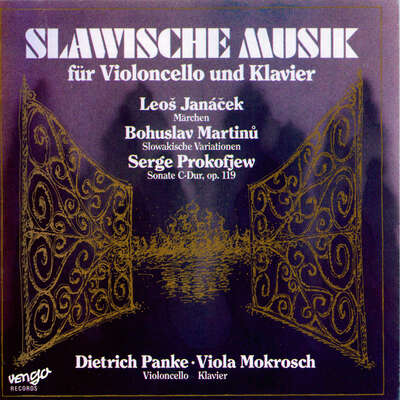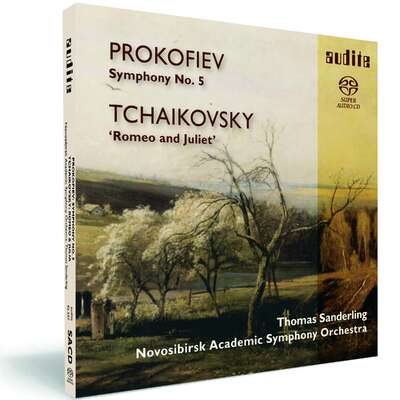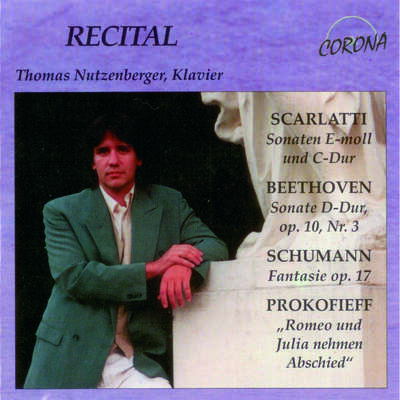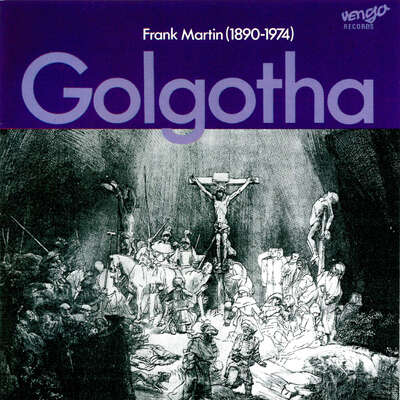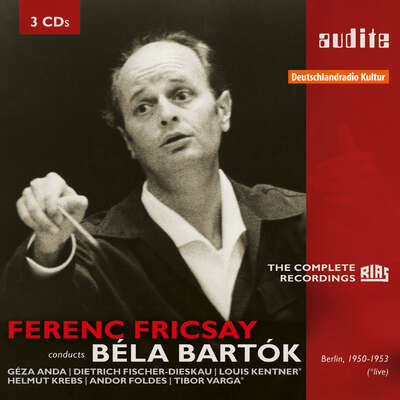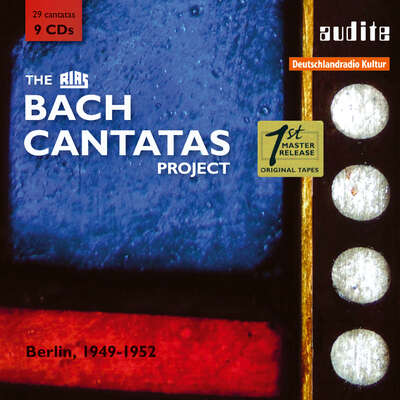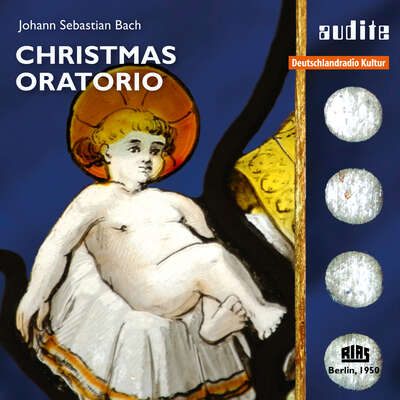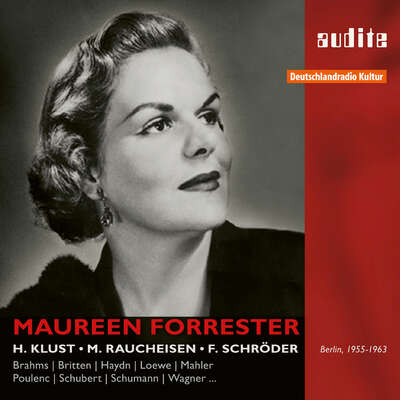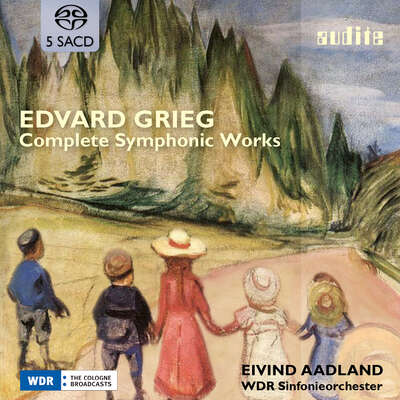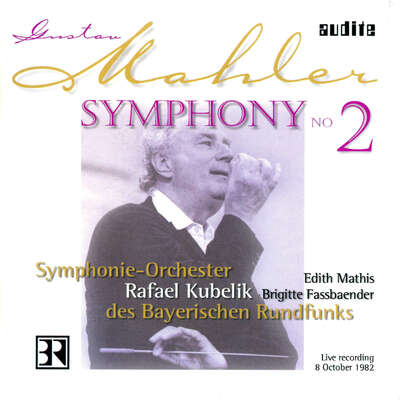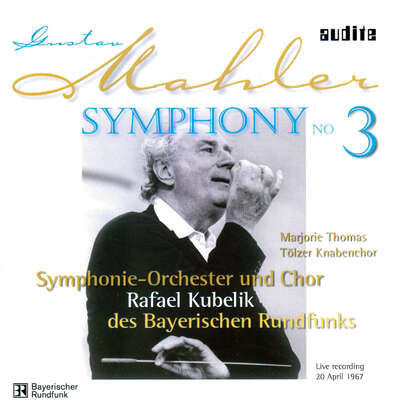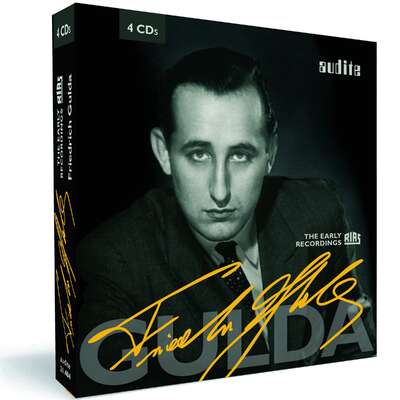
Prokofiev’s 1937 Cantata for the 20th Anniversary of the October Revolution sets – during the "Great Terror" – central texts by Marx, Engels, Lenin and Stalin on a gigantic choral and orchestral scale. Alongside military tumult and sonic euphoria, the score also offers three instrumental movements as moments of reflection. An exceptional historical document, music of the highest compositional level.more
"The large ensemble reunited for this performance delivers a tenseful and slender sound superbly caught by the microphones." (Pizzicato)
Details
| Sergei Prokofiev: Cantata for the 20th Anniversary of the October Revolution | |
| article number: | 97.754 |
|---|---|
| EAN barcode: | 4022143977540 |
| price group: | BCA |
| release date: | 24. November 2017 |
| total time: | 41 min. |
Bonus Material
Informationen
Art at the time of the "Great Terror": Prokofiev's Cantata for the 20th Anniversary of the October Revolution
The twentieth anniversary of the October Revolution made the year 1937 a high point of Soviet culture. At the same time, the "Great Terror" under Stalin reached its gruesome peak. Prokofiev, who settled permanently in Moscow in 1936, knew which country he had entered. The first position amongst Soviet composers seemed to have been vacated when Shostakovich had become a non-person following the Pravda article Muddle instead of Music. Prokofiev indicated his cooperation: he was determined to become a Soviet composer. In the Cantata for the 20th Anniversary of the October Revolution he played out his genuine enthusiasm for mass scorings, combining colossal symphonic forces with a double choir, a brass band, an accordion ensemble and a gigantic percussion section. The cantata oscillates between revolutionary vehemence and lyrical melodies, between Russian folklore and riotous military tumult.
An exceptional historical document of the highest compositional level - released in the year of the 100th anniversary of the October Revolution.
Kirill Karabits, Music Director of the Deutsches Nationaltheater and Staatskapelle Weimar, realises this monumental work with the Staatskapelle Weimar, the Ernst Senff Chor Berlin and members of the Erfurt Air Force Band. Also called into action are a nine-piece percussion section, an accordion quartet, gun shots, alarm sirens etc. whilst the conductor himself uses a megaphone to give a rousing rendition of the texts.
Reviews
Stereoplay | 4|2020 | April 1, 2020
CDs für ultimative Dynamiktests
Revolutionskantate {Prokofieff} von audite
Das kolossale Spektakel hat Audite dem Dirigenten Kirill Karabits anvertraut. Der macht wie die Technik das Beste daraus.Mehr lesen
www.musicweb-international.com | Dec 2018 | Marc Rochester | December 1, 2018 Recording of the Year
The disc which made the biggest impact on me (and, I regret to say, my near neighbours) was a shattering recording of Prokofiev’s rarely-heardMehr lesen
Fanfare | October 2018 | Peter J. Rabinowitz | October 15, 2018 | source: http://www.fanfa...
[…] Crushing is a word that can equally apply to Prokofiev’s Cantata on the 20th Anniversary of the Russian Revolution, composed for the kind ofMehr lesen
American Record Guide | September / October 2018 | Donald R Vroon | September 1, 2018
This is not a first recording, but it may be the best. The first recording was in 1966, righ t after the premiere—though it was written in 1937 forMehr lesen
Fanfare | July / August 2018 | Huntley Dent | July 1, 2018
As a celebration of noise, Prokofiev’s Cantata for the 20th Anniversary of the October Revolution can be enjoyed; it’s a kind of über film scoreMehr lesen
Obedience is forced upon composers who have the misfortune to be trapped in authoritarian regimes, but Prokofiev wasn’t one—he returned from exile voluntarily. Shostakovich had the heart and courage to stand up against anti-Semitism in the Soviet Union and to offer protection to the beleaguered Mieczysław Weinberg. Prokofiev, so far as I know, didn’t confront repression, even though he personally knew people who had been vanished by the NKVD in the middle of the night. As a politically compliant composer he has a trove of boilerplate to his credit, including a cantata for the next 10-year celebration in 1947, which I haven’t heard. (Shostakovich had written To October to commemorate the 10th anniversary of the October Revolution in 1927.)
Many will feel that this rousing live performance under the skilled Kirill Karabits is disqualified by its stingy total timing and lack of fillers. In a blow to toadying, Prokofiev’s 10-part cantata met with official disapproval and wasn’t premiered until 1966. There’s a large percussion battering ram—I mean, battery—and the tunes are pitched to the tractor-driving classes. Among the eight-part chorus, which in this performance is very professional and not too large, the men are stout-hearted patriots and the women, too. For official occasions Prokofiev enjoyed being grandiose in his instrumentation, which on this occasion includes quadruple woodwinds and brass, the horns increased to eight. There’s a military band with saxophones and extra brass, some accordions for folk flavor, alarm bells, cannons, sirens, and Lenin’s voice orating through a megaphone (here undertaken by Karabits). Suddenly Wellington’s Victory sounds like a minuet for recorders and lute.
Reviewing an earlier recording conducted by Aleksandr Titov in 2016, Daniel Morrison considered the texts taken from Marx, Lenin, and Stalin. “I am not convinced by the suggestion in the notes for this recording that Prokofiev’s setting of these texts contains hidden meanings, that his treatment of them is ironic rather than fully committed. What does appear to me is that rather than praising the present, the work mostly looks back to the early history of the revolution, to a time when its promise to free mankind from bondage, to end exploitation, poverty, and imperialism, could still be taken seriously” (Fanfare 40:1). It’s a nonjudgmental judgment, but I doubt that Prokofiev had any illusions about the murderous extinction of those early ideals.
On musical grounds, which aren’t a major consideration, really, Karabits leads an effective charge, and I can recommend the performance to anyone who has a specific curiosity about this score on its own. The recorded sound is very good; final applause is included.
Fanfare | July / August 2018 | James H. North | July 1, 2018
Our tradition has it that Shostakovich and Prokofiev wrote a lot of potboilers to appease Stalin at the time of the terrors. This is a rareMehr lesen
How does one judge a performance of such stuff? The chorus shouts a lot, but that seems appropriate. The orchestra is rough, even when the brass band is silent. Overall, the performance does justice to the score. It’s also hard to evaluate the recorded sound of such music. I haven’t heard any of the several other recordings (Järvi, Kondrashin, Titov) and don’t want to. Recommended, I guess, to Prokofiev completists.
Fanfare | July/August 2018 | Peter J. Rabinowitz | July 1, 2018
Great music can’t be destroyed by a third-rate text, even one, like the libretto of Madama Butterfly, that is politically insensitive. But how aboutMehr lesen
To my ears, the music (in contrast, say, to Shostakovich’s in The Sun Shines on the Motherland) manages to hold its own—although I’d have to say that it does so more successfully if you put down the texts and listen without them. Written in 1937, it’s vintage Soviet-period Prokofiev, composed right after Romeo and Juliet and just before Alexander Nevsky. Not surprisingly, it shares more with the similarly propagandistic Nevsky than it does with Romeo. Certainly, the women’s melody that soars above the chanting men in the second movement has that beauty-of-the-vast-steppes yearning we get in the more sentimentally nationalist moments in the later score; and the “Revolution” movement is a clear prototype for the “Battle on the Ice.” And while the cantata has 10 movements and the concert version of Nevsky only seven, the two works have similar trajectories, moving from an ominous opening through a tremendous battle scene and a brief reflection on to a clangorous celebration. But the cantata makes Nevsky look tame. Indeed, in terms of sheer fire-power, it’s Prokofiev’s most extreme composition, featuring an eight-part chorus, a massive orchestra (16 woodwinds, 18 brass), an extra military band (more than a dozen brass players here), and an accordion group, not to mention extravagant percussion (including a siren), keyboard, and harps—all de-ployed, at the most dynamic moments, with a ferocity and textural density that looks back to the unflinching dissonances of the Second Symphony and The Fiery Angel.
It’s not music for the faint of heart. In fact, for a variety of musical and political reasons, the work was not performed in its entirety for more than half a century (for details on its history, see my review of the Järvi performance and Daniel Morrison’s of the Titov, Fanfare 16:4 and 40:1). But if you can take the ear-splitting onslaught, it is surprisingly—even surpassingly—uplifting: Anyone who tears up at the end of Nevsky or War and Peace will have a similar experience here. The effect is especially strong on this stunning new performance by Kirill Karabits, who charges through the music without a trace of apology. With superior work from his orchestra and chorus and first-rate engineering (maintaining clarity even in the most congested passages of the movement depicting the revolution), it’s the kind of recording that overwhelms you, just as the music was intended to do. To my ears, it makes an even stronger case for the work than any of the four predecessors I know, good as they are— Kondrashin’s (with significant cuts), Järvi’s, Titov’s, and Elder’s. Yes, those who insist that their CDs last more than an hour may find this short measure—but it’s hard to think of anything that would be an appropriate filler (Järvi’s selections from The Stone Flower are distinctly anti-climactic).
I wish there were a surround-sound version. Audite advertises the availability of a multi-channel download on the album jacket, but that’s an error—while there’s an excellent hi-res stereo download, the performance was recorded in two-channel only. With that small regret, this can be exuberantly recommended.
Fanfare | July/August 2018 | Henry Fogel | July 1, 2018
In two earlier reviews of recordings of Prokofiev’s Cantata for the 20th Anniversary of the October Revolution, Daniel Morrison (Fanfare 40:1) andMehr lesen
However, if you are persuaded by their advocacy, or if you wish to expand your collection of Prokofiev, this new release under Kirill Karabits, which has no other coupling, would not be the recording to get. Morrison reviewed a Cugate CD (006-2) that also contained two other politically inspired works by Prokofiev—A Toast (composed in 1939 for Stalin’s 60th birthday) and Cantata for the 30th Anniversary of the October Revolution from 1947. While Morrison was positive, and noted the logic of the couplings, as a performance he preferred Neeme Järvi’s Chandos (9095) recording, which includes excerpts from Prokofiev’s ballet The Stone Flower. I too admire the Järvi recording for its intensity and thrust.
A 41-minute disc (some 32 seconds represents applause) would be justified if there were something extraordinary about Karabits’s performance, but there isn’t. His approach is certainly dramatic and energetic, but it lacks the specificity of coloring found in Järvi’s performance, and Chandos’s recorded sound is superior as well. The sound here is overly resonant and a bit muddy. There are very helpful program notes, and full text and translation.
www.musicweb-international.com | Monday May 14th 2018 | Richard Kraus | May 14, 2018 | source: http://www.music...
Prokofiev composed this notoriously problematic cantata after his return to live in the Soviet Union, following nearly two decades of itinerate lifeMehr lesen
In musical terms, Prokofiev created a neoclassical dramatic choral work, albeit one that assumed gargantuan form, with double choir, orchestra, accordions, brass band, siren, and marching feet. By contrast, Stravinsky’s almost contemporaneous, 1930 Symphony of Psalms seems still more chaste. Stravinsky set conventional religious texts, while Prokofiev turned to the words of Marx, Lenin, and Stalin. Lenin and especially Stalin turned out to be too dangerous for anyone to dare perform in 1937, and the work did not receive its premier performance until 1966, long after Prokoviev’s death, and with the two movements based on Stalin removed (Simon Morrison’s The People’s Artist, invaluable for making sense of Prokofiev’s Soviet years, provides ample detail).
With a different text, the cantata would likely have met a happier fate, even in those dark times. This is the period in which Prokofiev composed such popular works as Romeo and Juliet, the Second Violin Concerto, and Alexander Nevsky, and the Cantata for the 20th Anniversary of the October Revolution is clearly their musical cousin. Among the work’s highlights is “the Philosophers,” a setting of Marx’s Eleventh Thesis on Feuerbach (“Philosophers have hitherto only interpreted the world in various ways; the point is to change it”). The men chant an ostinato in low voice, joined by a melody by sopranos and altos which soars above them. A short movement taken from Lenin’s What is to be Done?” is exciting, and a longer Lenin setting cranks up the tension even higher, at times resembling Alexander Nevsky’s Battle on the Ice. Kirill Karabits assumes Lenin’s voice through a megaphone. An energetic six minute “symphony” (one of four instrumental movements) seems as if it escaped from a ballet score, while the concluding movement, quoting Stalin on the Soviet Constitution, ends the work with uplift and peace, again sounding a lot like Romeo and Juliet.
It is probably easier to enjoy this cantata for its music if you do not know Russian. In 1937 Russians dared not sing Stalin’s words because he was fearsome. After Stalin’s death, they avoided singing them because they were odious. This Cantata is not alone in the composer's output. When it comes to great composers abasing themselves before Stalin, his 1939 Zdravitsa (Hail to Stalin) may set the standard. Yet Shostakovich’s 1949 music for the film, The Fall of Berlin, contains a section, “Stalin’s Garden,” whose cloying angelic choir is either a masterpiece of obsequiousness or of cynical critique, or perhaps both. In any event, enough time has passed to listen to Prokofiev’s Cantata as music. We do not ask if Mozart believed in the mass, or question if he should have composed La Clemenza di Tito to praise a reactionary Habsburg Emperor. Mozart and Prokofiev were working musicians, and sought patronage from those who were in a position to support their art.
There is a 1992 Chandos recording by Neeme Järvi which hold up quite well to this new recording. Järvi takes five minutes longer, but with no loss of energy. Karabits’ zippier tempos work better for me, and Audite captures detail obscured in the older recording. If you have the Järvi version, you do not need to replace it, but if you are new to the work, Karabits is preferable. The CD booklet has a photo of the musicians overflowing their stage. It is difficult to record such giant forces, and Audite engineers have done an excellent job in bringing clarity to what could easily sound muddy. This recording is distressingly short in timing, but has lots of players, so at least on a musician-per-minute basis it can be counted as a bargain.
This work turns out to be better than many may fear, once the anxiety about Stalin is set aside. Still, it is probably of appeal mostly to those who enjoy Semyon Kotko and other less-performed Soviet-era music by Prokofiev.
www.classical.net | 11.04.2018 | Robert Cummings | April 11, 2018 | source: http://www.class...
Full texts are provided by Audite to round out what must be regarded as an important recording, one that is a must for Prokofiev's admirers.Mehr lesen
http://mz.kmpztr.ru | 01.04.2018 | April 1, 2018 | source: http://mz.kmpztr...
Karabits [versucht] auf diese Weise, die Einzigartigkeit der Kantate sowohl in der Musikgeschichte als auch in der Arbeit von Prokofjew zu zeigen. Und er macht es mit Erfolg: Wie in der Moskauer Interpretation von "Babi Yar" ist sein Formgefühl großartig. Fragmente, die individuell unterschiedlich erscheinen können, bilden ein ideales Ganzes, und das Finale vor dem Finale der orchestralen "Symphonie" ist einfach wunderschön. Für die erste Bekanntschaft ist Titovs Aufnahme vorzuziehen, aber für ein neues Treffen mit der Kantate ist die Aufnahme von Karabits gut.Mehr lesen
Record Geijutsu | 2018.4 | April 1, 2018
Japanische Rezension siehe PDF!Mehr lesen
Fono Forum | April 2018 | Thomas Schulz | April 1, 2018
,,100 Jahre Kommunismus" – so lautete das Motto des Kunstfests Weimar im vergangenen Jahr. Da lag es auf der Hand, ein Werk aufs Programm zu setzen,Mehr lesen
Nichtsdestoweniger hat die Partitur einiges zu bieten – nämlich nicht nur niederschmetternde Wucht, sondern auch avantgardistische Kühnheit bis hin zu Geräuscheffekten (Gewehrsalven, Sirene, Sturmglocke), wie sie Stalin damals garantiert nicht gefallen hätten. Der Dirigent Kirill Karabits verwirklicht gemeinsam mit der Staatskapelle Weimar und dem Ernst Senff Chor Berlin auf bewundernswerte, ja gnadenlose Weise die Extremwerte, lässt es sich auch nicht nehmen, an einer Stelle das in der Partitur geforderte Megafon selbst in die Hand zu nehmen und Lenin'sche Parolen über dem orchestralen Getümmel zu skandieren. Das ist schon ein außergewöhnliches Erlebnis. Die Qualität der einzigen anderen Gesamtaufnahme des ungekürzten Werks unter Neeme Järvi (Chandos) wird mühelos erreicht, wenn nicht überboten. Da fällt auch die magere Spieldauer von 42 Minuten nicht weiter ins Gewicht.
www.musicweb-international.com | Thursday March 22nd | Dan Morgan | March 22, 2018 | source: http://www.music...
Recorded a hundred years after the seismic event it celebrates, this piece finds Kirill Karabits in a very different world to that of Kara Karayev,Mehr lesen
As so often, serendipity has played a part in the genesis of this review. Waiting to board a train many years ago I bought a copy of the BBC Music magazine [Vol. 5 No. 2], barely glancing at the cover-mounted CD. Only when I got home I noticed it contained live performances of the Prokofiev Cantata and Shostakovich’s To October, the latter written for the 10th anniversary of the Revolution. Both feature the BBC Symphony Orchestra and Chorus, augmented by the Geoffrey Mitchell Choir, under Mark Elder. These works were new to me, but such is the proselytizing passion of the performances that they quickly became firm favourites.
Then, a few weeks ago, John Quinn mentioned this new Karabits recording. I thought no more about it until a chance encounter on a web forum, which indicated a 24/48 download could be had, direct from Audite, for a miserly €4.99. Yes, it is only 42 minutes of music, but it’s far better value than the CD, which costs up to three times as much online. Given that high-res downloads are generally overpriced, this one is a bona fide bargain. What’s more, it includes a digital booklet with texts and translations: other labels, please note.
Speaking of bargains, Neeme Järvi’s 1992 recording, with the Philharmonia Orchestra and Chorus, was reissued in 2009; the 16-bit download – with Pdf booklet and artwork – is available from Chandos.net for just £7.99. And that looks even more tempting when you factor in excerpts from Prokofiev’s ballet, The Stone Flower. It’s a fine album – more on that later – but it’s not in the same league as Järvi’s sensational (R)SNO pairing of Alexander Nevsky and the Scythian Suite; recorded in spectacular sound, these are my benchmarks for both works. As an aside, I’m pleased that Chandos updated their website a while back; not only does it look good, it also works well.
Intended to chart the rise of the Soviet Union from the start of the Revolution in October 1917 to the consolidation of Stalin’s power in the 1930s, this ten-movement Cantata fell victim to the political uncertainties of the time. Finally premiered in 1966, the piece demands a full orchestra, eight-part chorus, military band, bells, sirens, sundry ordnance and the ‘voice of Lenin’ heard through a megaphone. Karabits takes that role here – Gennadi Rozhdestvensky does it for Järvi – all of which adds to the fun. I say that because, at times, it’s not easy to take this music too seriously. Ditto Shostakovich’s To October, which actually sounds quite modest next to Prokofiev’s ear-battering behemoth.
Goodness, the start of Karabits’s Cantata is hair-raising, the percussion seat-pinning in its presence and power. The chorus is equally impressive when it enters in the second movement, Philosophers, and there’s plenty of thump and thrust when it comes to Marching in Close Ranks and the Interlude that follows. Bombastic? Oh yes, but it’s oddly compelling, too. The harp figures in Revolution are nicely done and the singing is suitably animated; ideally, the choral spread could be wider, the audio image deeper, but that’s a minor quibble. At least the bells are bright and very audible, and the siren sounds terrific; as for the conductor, he makes a rousing Vladimir Ilyich, loud hailer and all.
Interestingly, Karabits often presages the style and sound of the upcoming Nevsky, raspy brass and febrile chorus to the fore. Victory and The Pledge, marked Andante and Andante pesante respectively, provide some respite before the rather attractive little Symphony and the hymn-like finale, The Constitution. The vast forces deployed – Järvi and Elder are more modest in that respect – ensure a pate-cracking performance, but, alas, it’s not one I’d wish to revisit (although I am keen to hear Karabits conduct Nevsky and Ivan). Judging by the applause, the Weimar audience clearly felt they got plenty of bang for their buck.
John Quinn felt Karabits’s Cantata had more impact than Järvi’s, and, in general, I’d agree. However, there’s a clarity – a seriousness, even – to the latter’s reading that makes this newcomer seem even more overblown than it is. I suppose one could argue such public paeans need to be played for all they’re worth, but the downside here is that Karabits misses much of the care and craft embedded in the score. Despite fine playing and singing, Järvi is probably too restrained. Nevertheless, Ralph Couzens– Ben Connellan assisting – provided a vivid, well-balanced recording that’s a pleasure to listen to. The filler is a welcome bonus.
Recorded live at the Royal Festival Hall in February 1996, Elder’s performance – engineered by Philip Burwell – is blessed with a rare sense of space. The choral spread is excellent, and, thanks to chorus master Stephen Jackson, there’s a unanimity and full-throated fervour to the singing that rivals can’t match. Most important, Elder’s reading is intensely musical, without sacrificing raw excitement; the Maxim gun in Revolution, for example, is just marvellous. He also brings coherence and cumulative power to the piece, and, in so doing does full justice to the score; indeed, I can’t imagine a more thoughtful and illuminating account of the Cantata than this. Even better, the CD can be had second-hand for a few quid. Now that’s a bargain!
Karabits goes way over the top and Järvi doesn’t go far enough; Elder gets it just right.
Asahi Shimbun | 15.03.2018 | March 15, 2018
Japanische Rezension siehe PDF!Mehr lesen
www.musicweb-international.com | Thursday March 8th | Marc Rochester | March 8, 2018 | source: http://www.music...
In 1936 Prokofiev settled permanently in the Soviet Union having fled in the wake of the October Revolution of 1917. The general line is that he hadMehr lesen
Certainly one wonders what prompted Prokofiev to submit to the iron fist of Soviet rule, and we cannot rule out bare-faced ambition. Yet it is difficult to reconcile the Prokofiev of enfant terrible repute with the 45-year-old man willing, it would seem, to compromise his artistic ideals for the simple lure of fame within a regime he already knew full well was discredited in the eyes of the international community. Stranger still was his willingness to bend to the will of his new political masters by composing this massive 10-section Cantata celebrating the 20th anniversary of the very event which had driven him from Russia in the first place. With texts by Karl Marx, Lenin and Stalin, as well as a generous dose of the kind of “social realism” demanded of Soviet composers at the time, it would seem outwardly that Prokofiev was effectively rolling on his back and wriggling his legs in the air, in the hope that the regime would tickle his tummy.
The music, however, tells a very different story. Again the general line is that Prokofiev decided the satirical undercurrent in his music was a shade too obvious for his own good, and suppressed the work (it was never performed until over a decade after both his and Stalin’s death). But Redepenning has her own theory. She suggests that there were those who viewed the “setting of texts by Lenin or Stalin as heresy”, and that some in power “were apparently irritated by the sound of Lenin’s speeches in combination with Prokofiev’s music”. In light of this, Molotov himself intervened and suggested that Prokofiev’s Cantata for the 20th Anniversary of the October Revolution be submitted for approval by the Committee on the Arts. On 19th June 1937 Prokofiev did indeed play through the work to the committee, but Redepenning states that he not only played the work on the piano but sung it “very badly” at the same time. Whether Prokofiev deliberately sung it very badly in order for it to be rejected, or simply because singing and playing simultaneously were not his thing, we can only speculate (Redepenning chooses not to).
All this looks as if the work might simply have been a typically overblown Soviet propaganda extravaganza to honour the heroes of the Bolshevik Revolution, the noble acts of Lenin and Stalin and the glorious devotion to the regime of the proletariat, and it is perhaps this, more even than the vast forces employed (amounting to several hundred individuals) that have kept the work on the periphery of Prokofiev discography. This recording unequivocally proves otherwise. This is a tremendous outpouring of the composer’s genius, brilliant and inventive, clearly dating from the same time as Romeo and Juliet and Alexander Nevsky but both highly original and at times breathtakingly inventive.
A chorus of accordions, ostensibly included to tick the boxes required by the authorities to elevate the popular music of the people, seems such a fantastic new ingredient in Prokofiev’s highly colourful orchestral palette, that one wonders why he did not use it in other works. The thundering percussion, the clanging bells, the blaring sirens and the speeches relayed through megaphone, might have political reasoning, but musically they add an unforgettable touch. Some of us may read the ghastly texts, hideous in their mundanity and triteness, and wonder how such drivel can inspire great music. (Others may wonder how such glorious political sentiments can begin to be matched by music of any description – never let it be said that MusicWeb International takes any particular political stance.) But the extraordinary thing about this work is how Prokofiev’s music manages to walk that fine line between dramatic depiction of the events related in the words, and biting satire which, I am inclined to think, we recognise more with the benefit of hindsight.
Recorded live at a performance during last year’s Weimar Kunstfests, one is conscious of a certain frisson of excitement and a tangible sense of electrical charge running through the performance – taking place, it should be said, on soil which, barely a quarter of a century before had been firmly within the Soviet bloc. The tremendous din of everything being thrown at the audience at the great climaxes of the sixth movement, “Revolution”, perhaps one of the most unrestrained outbursts of musical violence since the Scythian Suite, obliterates any obvious audience noise, but the exuberant applause at the end (quickly curtailed on the recording) pays tribute to what is, by any reckoning, a powerful and electrifying performance in which Karabits marshals his massed forces with almost military precision; this is a truly fabulous exhibition of musical control. The recording captures the immensity of the sound superbly, although one suspects a constant hand on the levels to prevent the true dynamic range of the performance becoming too much of an obstacle to domestic listening.
Choir & Organ | March / April 2018 | Brian Morton | March 1, 2018
If your paradigm for Soviet music of the 1930s is Shostakovich – and that's probably a mistake – then one searches Prokofiev's cantata in vain forMehr lesen
BBC Music Magazine | March 2018 | March 1, 2018
STUDIO FOCUS Kirill Karabits
The conductor on his live recording of Prokofiev’s Cantata for the 20th Anniversary of the October Revolution
The 20th anniversary of the October Revolution in 1937 triggered many patriotic works, including this one…<br /> One could say this is a propaganda pieceMehr lesen
One could say this is a propaganda piece but at the same time there’s truth in it. While Prokofiev had to make compromises – he originally used only text by Lenin, but was then told to add words by Stalin too – he still remained true to himself. He is praising a new type of man born after the revolution, and he is saying that society will be forever changed. He really believes this, and you can hear it in the music.
But the work wasn’t performed as part of the celebrations…
The authorities wanted something straightforward and secure, and this wasn’t – no one could predict how people would react to it. It’s so overwhelming and strong – it’s a masterpiece rather than something that praises the Communist Party.
How did you come to record it?
It wasn’t planned as a recording. My main motivation was to perform it. With 2017 being the 100th anniversary of the October Revolution, I said to myself, if I were ever to conduct it, now is the moment. The Kunstfest Weimar like unusual projects so I had the idea to present two Prokofievs in one of their concerts last summer – this work, alongside Gabriel Prokofiev’s Concerto for Turntables. Then Deutschlandradio in Berlin heard about it and wanted to do a broadcast. So then we talked to audite and they said they’d love to release the recording.
How challenging was it to perform/record?
The selection of voices and instruments Prokofiev uses is extraordinary – there’s a huge orchestra, an accordion ensemble, a large choir, a military band with extra percussion… With around 200 performers in total, we couldn’t all it on the stage so we had to use part of the hall as well. It was also an extraordinary task for the radio people to record it. They recorded our first rehearsal and also the general rehearsal so, while most of the material on the recording is from the live performance, they had enough extra material to choose from.
Tell us about the gunshots and the megaphone…
It wasn’t a real gun but it looked like one, so we had to warn the audience to stay calm. And I got to imitate Lenin by speaking his words into a megaphone… It wasn’t easy to do because I had to turn to the audience while carrying on conducting! It was all very theatrical, but that’s what Prokofiev wanted.
How involved were you in the editing?
They sent me the final edit, I listened carefully and gave back my comments. I’m very pleased with the end result. I wasn’t compromising as a conductor just because I knew it was being recorded. It’s a fantastic document of an extraordinary concert – we’ll probably have to wait another 100 years for another performance!
The recording, on audite, is released in the UK on February 16 and will be reviewed next issue.
One could say this is a propaganda piece
Diapason | N° 666 - Mars 2018 | Christophe Huss | March 1, 2018
C ette fresque de 1937 « pour deux chœurs mixtes, orchestre symphonique, orchestre de cuivres, ensemble d’accordéons et instruments bruyants » aMehr lesen
Au disque, cet Opus 74 est associé à la gravure Melodiya de Kirill Kondrachine... qui en assura la création ! Car la partition, destinée à plusieurs centain es d’exécut ants, ne fut pas jouée en 1937, et Prokofiev ne l’entendit jamais. En mai 1966, lorsque Kondrachine en donna la première audition, Staline était tombé en disgrâce et les mouvements composés sur ses textes (dont le finale !) furent retranchés, y compris pour le disque. Kondrachines’en tira tant bien que mal en reprenant le deuxième mouvement ( Les Philosophes ) en guise de conclusion, mais la solution, bancale, ne faisait pas illusion. Il fallut attendre 1992 pour découvrir le premier enregistrement intégral, en dix volets, sous la baguette de Neeme Järvi pour Chandos. Avec Le Serment ( VIII ), l’intégralité de la Symphonie qui lui fait suite ( IX ) et le finale, intitulé La Constitution.
Kirill Karabits dé fend la même partition lors de ce concert du 23 août 2017 à Weimar. Sa direction fluide et vive tente de retrouver le souffle de Kondrachine, tandis que Järvi ad optait un ton plus grandiloquent. Les cinq minutes qui, tout compte fait, séparent les deux interprétations illustrent bien cette différence. En insistant sur l’aspect musical plus que sur le message, Karabits nous amène à percevoir la Cantat e pour levingtième anniversaire de la révolution d’Octobre comme le terrain expérimental de sa collaboration avec Eisenstein pour les films Alexandre Nevski ( 1938) et Ivan le Terrible (1942-1946). Il se plaît aussi à mettre en valeurs les singularités de l’orchestration (groupe d’accordéons) et sa démesure. Le sixième volet, Révolution, véritable laboratoire de la « Bataille sur la glace » de Nevski , avec caisse claire ob nubilante, sirènes et harangue de la foule au porte-voix constitue le moment fort du CD.
Il reste une marge infime pour surpasser encore cet accomplissement : un chœur russe, avec ses singulières couleurs vocales et un complément de programme dopant un minutage bien chiche.
BBC Radio 3 | 24.02.2018 | Andrew McGregor | February 24, 2018 BROADCAST
[...] the music is gritty, colourfully theatrical. There’s nothing apologetic about the way they engage with it – they make you believe in Prokofiev’s music. [...]<br /> If it’s ever to shake off the tag of being a piece of propaganda with slim musical pickings then I suspect this is the recording.<br /> Mehr lesen
If it’s ever to shake off the tag of being a piece of propaganda with slim musical pickings then I suspect this is the recording.
www.europadisc.co.uk | 01.02.2018 | February 1, 2018 | source: https://www.euro...
Karabits here shows himself a natural master of Prokofiev’s musical language, knowing exactly when to apply drive and grandeur without destroying the music's underlying lyricism. [...] With superb orchestral support, the choral contributions are uniformly excellent, the balance ideal, the sense of commitment palpable. Mehr lesen
Gramophone | February 2018 | David Gutman | February 1, 2018 | source: https://www.gram...
Following Prokofiev’s decision to reinvent himself as a Soviet composer, he wrote much that remains ideologically controversial. Less nakedlyMehr lesen
Set against the familiar Chandos option, Karabits drives noticeably faster in those movements which include a text. While there are sound musical reasons for the attendant lightening of texture, there may also be a conscious attempt to downplay the ideological content. The results are undeniably exciting if less than seismic, the recorded sound wonderfully clear without threatening to overwhelm domestic speakers. No coupling either; but anyone who enjoys Karabits’s lithe and lucid work with his other, British orchestra will relish this unexpected addon to his Bournemouth-made Prokofiev symphony cycle (Onyx).
Could this be the new 1812 Overture? Or should we be wary when a score so directly represents a submission to and celebration of unpalatable politics? There’s little evidence of irony in Prokofiev’s October Cantata yet Karabits’s musicians, many of them former East Germans, seem unfazed, plainly relishing Prokofiev’s unlikely mix of 1920s agitprop, cinematic pattern music and longbreathed, ‘socialist-realist’ melody. A modicum of applause is retained and you may even want to join in.
Stereoplay | 2|2018 | MC | February 1, 2018 Unbekümmert bombastisch
Es ist der Ehrlichkeit des Dirigenten und seinem gestalterischen Weitblick zu verdanken, dass die collageartige Ästhetik dieser Kantate ihre Wirkung nicht verfehlt. Der plastische Klang des Live-Dokuments macht den unbekümmerten Bombast der Klangsprache auch zu Hause nachvollziehbar.Mehr lesen
The Arts Fuse | 26.01.2018 | Jonathan Blumhofer | January 26, 2018 | source: http://artsfuse....
The current performance by the Ernst Senff Chor, Staatskapelle Weimar, and conductor Karabits fully embraces the music’s wild contrasts of extremes. The choral contributions are mighty: sometimes fierce, sometimes warm, always robust and precise. Much the same can be said for the orchestral playing, which is full of biting rhythms, aggressive attacks, and a wild array of colors. It says much about the interpretation, though, that the piece comes over with such cohesion, never, even in its loudest episodes, simply dissolving into noise. This is an ensemble and conductor that have the music in their blood and they proselytize for it accordingly.Mehr lesen
www.artalinna.com | 22 January 2018 | Jean-Charles Hoffelé | January 22, 2018 | source: http://www.artal... Sang et cendres
Le concert ici restitué fut donc un événement, Kirill Karabits y réglant avec brio [...]Mehr lesen
allmusic.com | 05.01.2018 | January 5, 2018 | source: https://www.allm...
Is there an X factor coming from having performances by former East Germans under a Ukrainian? Probably, and you get the blood and thunder in the revolutionary passages from members of the Luftwaffenmusikkorps Erfurt as well.Mehr lesen
concerti - Das Konzert- und Opernmagazin | Januar 2018 | RD | January 1, 2018 Lautstarke Agitation
Diese Hommage macht sogar Tschaikowskys Ouvertüre 1812 zum Kinderlied! Prokofjews Kantate zum zwanzigjährigen Jubiläum der Oktoberrevolution ist ein tückischer Monolith. [...] Eine vorsätzlich fragwürdige Leistungsschau mit hypnotisierender Stoßkraft.Mehr lesen
www.musicweb-international.com | January 2018 | John Quinn | January 1, 2018 | source: http://musicweb-...
Prokofiev’s Cantata for the 20th Anniversary of the October Revolution is a work that requires vast forces, so opportunities to hear it don’t comeMehr lesen
The fact that it took the Cantata some 55 years to achieve a UK performance may partly be explained by the huge forces required, of which more in a moment. However, that’s not the whole story. It is, inevitably, a pièce d’occasion - and a highly politicised one at that – but even so it didn’t find favour in Stalin’s Soviet Union. You might have thought that a cantata which sets words from the writings and speeches of Marx, Lenin and Stalin would have ticked all the boxes, but such was not the case. When he wrote his excellent booklet note to accompany the Järvi recording Christopher Palmer had to admit that the reasons why the Cantata attracted disapproval were, at that time, unknown. He cited the conjecture of Oleg Prokofiev, the composer’s son, that by the time the work was finished, at the zenith of Stalin’s Great Terror, no one in the Soviet Union’s artistic circles dared to put their head above the parapet. Consequently, everyone was afraid to take responsibility for staging Prokofiev’s new score. Dorothea Redepenning, the author of the fascinating Audite note, is able to draw on more recent scholarship and it seems that Oleg Prokofiev was correct. In 1937 musical officialdom was wary of – or downright hostile towards – the idea of allowing the words of Lenin or Stalin to be set to music. Prokofiev was pressed to set different, preferably folk-like texts instead but he refused. After much frantic behind the scenes activity Prokofiev played through the Cantata at the piano in front of the State Committee on the Arts, singing the vocal parts himself. Perhaps unsurprisingly, this run-through went badly and the work was doomed. It was not included in the musical celebrations of the Revolution’s anniversary and, in fact, it was not heard until 1966. Even then cuts were made to make it more ideologically acceptable in the Soviet Union during the post-Stalinist era. Kirill Kondrashin, who directed the delayed premiere, was obliged to excise movements 8 and 10, Palmer tells us, because these set words by the now-discredited Stalin. He also made a large cut in the purely orchestral ninth movement. Kondrashin’s recording uses that truncated version of the score, I believe. I think I’m right in saying that the Järvi recording was the first to use the complete score.
So too does Kirill Karabits on this new recording. It was made live at a concert which was part of Kunstfest Weimar 2017, which marked the centenary of the Bolshevik Revolution. Kirill Karabits is Chief Conductor of the Bournemouth Symphony Orchestra. He set down with them a complete Prokofiev symphony cycle which I admired so I was keen to hear him direct this rarely-heard cantata. Since 2016 Karabits has also been Music Director of the Deutsches Nationaltheater und Staatskapelle Weimar and for this live recording he is at the helm of the Staatskapelle Weimar.
Prokofiev wrote the work shortly after his return to Russia from his lengthy self-imposed exile from post-Revolutionary Russia. It seems that he had been pondering a composition based on Lenin’s writings for some years so this work was not written on impulse in some burst of patriotic fervour by a returning exile. It is scored on a lavish scale. The basic orchestra is huge, including quadruple woodwind, eight horns, four each of trumpets and trombones and a pair of tubas. There’s also a vast array of percussion and an eight-part mixed choir. Lest they be forgotten, a substantial string section is also needed. But that’s not all. Prokofiev also wrote important parts for an accordion band and for a brass ensemble that is completely separate from the main orchestra’s brass section. There’s a photograph in Audite’s booklet which shows all the performers assembled for the concert. The choir and orchestra are squeezed onto the stage but two groups of players can’t be accommodated on the platform itself; off to the conductor’s left is the percussion department and on his right the extra brass are deployed – I count 14 brass players.
The key question is this: is it worth assembling this phalanx of performers for a work lasting just over 40 minutes? When I attended the Gergiev concert I reached the view that the sheer physical impact of the piece in the concert hall takes one aback. However, while I was impressed by this and by the technical excellence of the performance I was not greatly moved by the music. Having listened to this new Karabits recording – and made some comparisons with the Järvi – I’ve come to a rather different conclusion.
The Cantata for the 20th Anniversary of the October Revolution is cast in ten sections. The first bears an epigraph from The Communist Manifesto: ‘A spectre is haunting Europe – the spectre of communism…’ However, these words are not heard; it is a purely orchestral movement. Prokofiev’s music, vividly scored, conveys a sense of conflict and lowering power. The music also struck me as having an air of menace but, since there’s no Shostakovich-like subversive irony in this score, Prokofiev probably didn’t intend to suggest menace.
The textual source of the second movement is an unlikely one for a musical composition: Marx’s Theses on Feuerbach. Here, the listener is struck by the contrast between, on the one hand, the staccato writing for the male voices and, on the other hand, the rather lovely lyrical music for the female voices, which soars over the men’s’ material. Eventually, all the voices sing the lyrical music, which is very typical Prokofiev. There follows a short instrumental Interlude which features quite spooky orchestration.
Movement four, setting some words of Lenin, is music of struggle and determination; that fits the tenor of the words very well. Another orchestral Interlude follows. Here, the music is urgent, even strident, and Karabits ensures that his orchestra projects it strongly. Then we reach the sixth section, which is the longest and most dramatic. Here, using an assemblage of extracts from speeches and articles authored by Lenin in October 1917, Prokofiev depicts the Revolution itself. There’s a high level of dissonance and considerable urgency in the writing and the present performance is red-blooded and gripping. Throughout the Cantata the contribution of the Ernst Senff Choir is marvellous but in this movement special mention must be made of the clarity of their diction. In the hubbub I couldn’t always follow the words but most of the time I could hear what they were singing. From about 6:00 onwards the writing is particularly tumultuous with contributions from, among others, an alarum bell and a siren. At 6:55 we hear the accordion band for the first time. I presume their involvement here and elsewhere later in the score is intended to suggest proletarian involvement in the Revolution. To be honest, the scoring rather suggests piling Pelion on Ossa as the movement progresses but it must be said that Prokofiev sustains a genuine sense of the fervour of the crowd and the febrile atmosphere of the Revolution is conveyed. In the midst of the musical melee a speaker is required to declaim some of Lenin’s words through a megaphone. Here Karabits does the job himself – presumably leaving the vast ensemble to its own devices for a few seconds. Neeme Järvi has Gennady Rozhdestvensky, no less, to do the honours. It doesn’t sound to me as though the distinguished conductor used a megaphone – I’m sure Karabits does – but his voice is marginally the clearer of the two.
After all this frenetic excitement, the seventh movement, ’Victory’, is, as you might expect, a big, aspiring chorus which gives thanks for the success of the Revolution. At 4:16 listeners who are new to the work may be slightly surprised by an unexpected sound. It’s the choir, who are instructed to march on the spot as they sing “We need a measured advance of the iron battalions of the proletariat”. Their marching continues almost to the end of the movement and it’s surprisingly effective.
Movement eight brings the first of ‘Uncle Joe’ Stalin’s contributions to the proceedings – this was one of the movements that was cut in 1966. ‘The Oath’ is an extract from the oration he delivered at Lenin’s funeral bier. This is a hymn of Soviet Socialist Realism though Prokofiev surprises from time to time through his rather restrained use of dynamics. At the end, however, there are no holds barred: rhetorical pledges of loyalty to Lenin’s memory are declaimed at maximum volume.
The penultimate movement is an orchestral Symphony. Much of the music is vigorous and celebratory, though from time to time we hear passages in a gentler vein and these are welcome. The movement features a good deal of very typical – and very effective – Prokofiev scoring. The finale bears the title ‘The Constitution’ and it’s another setting of a Stalin speech. The movement is something of a slow burner but eventually rises to a huge C major apotheosis. I recall that the audience responded enthusiastically to the performance I attended in Birmingham and the Weimar audience is no less appreciative.
I said that I’d reached a different view of the Cantata as a result of hearing the Karabits recording – and re-sampling the Järvi version. I found that the trick was to ignore, or at least overlook, the words once I’d got a good idea of what’s going on; thereafter I simply concentrated on the music itself. The music isn’t top drawer Prokofiev but I now think that it’s better – much better, in fact – than I first thought. The choral writing is very effective but it’s the colourful, inventive and vivid orchestral scoring that really invests the work with considerable interest. The work’s cause is helped no end by the fervour and dynamism of the present performance. Here Kirill Karabits confirms again his stature as a Prokofiev interpreter. The performance is never less than exciting and the quality of both the choral singing and the playing of the Staatskapelle Weimar is superb.
What advice, then, should I give prospective purchasers? The Neeme Järvi performance is a very fine one, though I fancy that the Karabits version has the extra electricity of a live performance. The Chandos recording wears its 25 years very lightly. It’s still a most impressive piece of engineering. However, the Audite recording, made in collaboration with Deutschlandradio, has rather more impact and this, I think, is for two reasons. Firstly, the excellent Philharmonia Chorus is a little further back in the sound picture on the Järvi disc – I think also that the professional Ernst Senff Choir sings even more incisively than do their British rivals. Secondly, the Chandos recording was made in a church - All Saints, Tooting – whereas, to judge from the booklet photograph, the Karabits performance was given in a wood-lined modern concert hall.
So, I think the Karabits performance and recording both have a slight edge. However, one can’t overlook that the Järvi disc comes with a substantial filler in the shape of excerpts from the ballet, The Tale of the Stone Flower. In all, his disc runs to 72:43. By contrast, the Audite playing time of just 41:55 looks distinctly short measure. I looked up the Weimar concert programme and found that the accompanying piece was the 2007 Concerto for Turntables and Orchestra by Prokofiev’s grandson, Gabriel Prokofiev (b 1975). There are probably good reasons why that piece wasn’t included on the disc also but it’s a pity that some kind of ‘filler’ could not have been included to make this new disc a more economical proposition.
On balance, if you already have the Järvi in your collection you can rest easy: it remains a fine version. However, if you can live with the short playing time, I think this new Karabits recording has the edge over the Järvi disc. It’s a very impressive addition to the Ukrainian conductor’s discography and it’s certainly opened my ears to Prokofiev’s cantata, revealing it as a work of great interest.
Choir & Organ | January / February 20218 | January 1, 2018
On release
New discs coming out in…January and February 2018
The Russian Revolution, whose centenary was marked in various ways throughout 2017, has always been regarded with abhorrence, ambivalence, orMehr lesen
Rondo | 16.12.2017 | Guido Fischer | December 16, 2017 | source: http://www.rondo...
[...] die im Rahmen des Kunstfests Weimar mitgeschnittene Neuaufnahme [ist] aber mehr als nur das Zeitdokument einer vergangenen Epoche. Was das bisweilen collagenartige Gefüge angeht, bei dem russische Volksliedanleihen auf schneidende Rhythmen, Akkordeon- auf Sirenenklänge, Straßen-Parolen auf sakrale Hymnen treffen, gelingt der höchst engagierten Teamleistung unter der Leitung des Ukrainers Kirill Karabits ein Agitprop-Sound, der nicht von gestern ist, sondern in seiner Modernität durchaus packend.Mehr lesen
RBB Kulturradio | Fr 15.12.2017 | 13:10 | Matthias Käther | December 15, 2017 | source: https://www.kult... BROADCAST
Sendebeleg siehe PDF!Mehr lesen
SWR | SWR2 Musikstunde, 04.12.2017 | Michael Struck-Schloen | December 4, 2017
BROADCAST
Moloch Moskau ‒ eine musikalische Entdeckung
Mitte der dreißiger Jahre wurden Moskau und die Sowjetunion von einer Welle staatlicher Gewalt überzogen; Hunderttausende, darunter viele KünstlerMehr lesen
Musik: Sergej Prokofjew: Kantate zum 20. Jahrestag der Oktoberrevolution op. 74
7. Sieg (Text: W. I. Lenin)
„Sieg“, ein Satz aus Sergej Prokofjews Kantate zum 20. Jahrestag der Oktoberrevolution auf einen Text von Wladimir Iljitsch Lenin. 1937 war das Werk fertig, doch die Partei verzichtete auf eine Aufführung ‒ offenbar ging ihr die Vertonung der Texte von Lenin und Stalin letztlich zu weit. Während Stalin nach dem Zweiten Weltkrieg in der Stadt Moskau architektonisch seine Duftmarken setzte und sieben kolossale Hochhäuser im sozialistischen Zuckerbäckerstil bauen ließ ‒ die so genannten „Sieben Schwestern“‒, hielt er sich im Kreml erstaunlich zurück. Vielleicht war ihm die Zarenresidenz letztlich nicht geheuer. Erst sein Nachfolger und ideologischer Totengräber Nikita Chruschtschow hat sich im Kreml noch einmal verewigt, als er für die Parteitage der KPDSU einen neuen Kongresspalast aus Glas, Beton und Marmor bauen ließ. Um das Gebäude im kantigen Funktionalismus nicht allzu penetrant aus dem historischen Ensemble herausstechen zu lassen, wurde es 17 Meter in den Kremlboden hineingepflanzt ‒ besticht aber immer noch durch imposante Hässlichkeit. Heute regiert Wladimir Putin im Kreml wieder unter dem russischen Doppeladler ‒ und fühlt sich in seinem Selbstverständnis den Zaren näher als den Sowjetfürsten. Die Kirchen sind wieder geöffnet, die Religion und der Glaube an die Macht des Geldes haben den Kampf für die Weltrevolution ersetzt. Ein Verwaltungsgebäude aus dem Jahr 1934 hat Putin schon abreißen lassen, um wieder Platz für das Tschudow- und das Himmelfahrtskloster zu machen, zwei prominente Opfer von Stalins Abrisspolitik. Aber noch fehlt das Geld für eine Rekonstruktion der Kirchenbauten ‒ und so dürfen an der Baustelle erst einmal die Archäologen die Geschichte des Kremls untersuchen. Finden dürften Sie genug. Die politische Jubelstimmung, die mit der Perestroika aufkam, ist mit Putins Aufstieg weitgehend verflogen; Hoffnungen auf einen demokratischen Wandel sind dem Lamento über den autoritären Regierungsstil des Präsidenten gewichen. […]
http://operalounge.de
| 01.12.1017 | Daniel Hauser | December 1, 2017 | source: http://operaloun...
Schostakowitsch, Tschaikowsky und Prokofjew bei Audite, Sony und Melodya
Russisches
Sergei Prokofjews Kantate zum 20. Jahrestag der Oktoberrevolution. Hundert Jahre Oktoberrevolution. Fast dreißig Jahre nach dem Zusammenbruch derMehr lesen
Nun also, zum 100. Jubiläum, besorgt mit dem Ukrainer Kirill Karabits ein weiterer renommierter Dirigent der jüngeren Generation eine Neueinspielung dieses zumindest problematischen Werkes im Zuge des Kunstfestes Weimar (Audite 97.754). Ihm zur Seite stehen der Ernst Senff Chor Berlin, die Staatskapelle Weimar und Mitglieder des Luftwaffenmusikkorps Erfurt. Es wurde also gewissermaßen alles in Gang gesetzt, um diesem wenig bekannten Werk eine neue Chance zu verschaffen und seinem künstlerischen Wert auf den Grund zu gehen. Vom Sturm auf das Winterpalais des Zaren über Lenins Tod bis hin zur Verabschiedung einer neuen Verfassung durch Stalin zieht sich das episch angelegte Opus. Dass es sich um eine Live-Aufnahme handelt, kann man gelegentlichen Publikumsgeräuschen entnehmen. Ansonsten ist der Klang ausgezeichnet eingefangen worden. Inwieweit der deutsche Chor den russischen Texten gerecht wird, müsste indes ein Muttersprachler beurteilen. Hervorgehoben werden sollte, dass die gerade erst im August erfolgte Aufführung bereits jetzt, im November, pünktlich zum 100. Jubiläum, auf CD erscheint.
Vergleicht man die Neuaufnahme mit der 50 Jahre alten unter Kondraschin (Melodija), fallen in den vergleichbaren Sätzen (damals entfielen ja derer zwei) die sehr ähnlichen, teilweise bis auf die Sekunde identischen Spielzeiten auf. Hat sich Karabits an Kondraschin orientiert? In einigen wenigen Abschnitten lässt dieser sich ein klein wenig mehr Zeit, so in der Zwischenmusik des dritten Satzes und beim Sieg der Revolution im siebten Satz. Dies allein ist freilich kein Qualitätsmerkmal. Dass die Moskauer Philharmoniker und der Staatliche Jurlow-Chor zu Breschnews Zeiten noch idiomatischer agieren als die gleichwohl sehr engagierten deutschen Kräfte, liegt auf der Hand. Besonders während des Revolutionssatzes (Nr. 6) geht Karabits gleichwohl aufs Ganze. Die ihm innewohnende Brutalität wird durch schrille Glocken und Sirenen und mörderische Maschinengewehrschüsse unterstrichen. Als Krönung des Ganzen dann noch ein Sprecher mit Megaphon, der die Stimme Lenins verkörpert. Karabits ließ es sich nicht nehmen, dies selbst zu übernehmen. Der dramatische Höhepunkt des Werkes darf hier verortet werden. Nach dem triumphalen Sieg sodann pathetisch verklärend der im achten Satz erfolgende Eid. Die an vorletzter Stelle placierte, rein instrumentale, etwa sechsminütige sogenannte Sinfonie könnte aus einer derselben des Komponisten stammen. Zuletzt die von Stalin auf den Weg gebrachte Verfassung, die diesen Namen kaum verdiente und in der alten Sowjetaufnahme auch gestrichen wurde. Naturgemäß erreicht das Pathos im Finale seinen Höhepunkt. Schwere Kost, die man sich allenfalls anlässlich allfälliger Jubiläen antun sollte. [...]
www.qobuz.com
| 27. November 2017 | Sandra Zoor | November 27, 2017 | source: https://www.qobu...
Revolution mit Prokofjew
Zum 100. Jahrestag der Oktoberrevolution veröffentlicht das Label Audite ein historisches Dokument...
Die Kantate changiert zwischen revolutionärem Ungestüm und lyrischen Melodien, zwischen russischer Folklore und tosendem Militärgetümmel. Ein bemerkenswertes historisches Dokument auf höchstem kompositorischem NiveauMehr lesen
Der neue Merker | 26. November 2017 | Dr. Ingobert Waltenberger | November 26, 2017 | source: http://der-neue-...
Das Kunstfest Weimar und Kirill Karabits, Chefdirigent des Deutschen Nationaltheaters und der Staatskapelle Weimar, haben sich entschlossen, 2017 den historischen Ereignissen mit einer beeindruckenden Aufführung dieser pompös aufgeblasenen opernhaften Kantate zu gedenken. Mehr lesen
Mitteldeutscher Rundfunk | MDR Kultur | 23.11.2017 | Dr. Dieter David Scholz | November 23, 2017 BROADCAST
Beim diesjährigen Weimarer Kunstfest hat Kirill Karabits das Werk auf der Suche nach dem musikalischen Erbe der kommunistischen Epoche ausgegraben und aufgeführt. Beim Label Audite ist es jetzt in hervorragender technischer Qualität eingespielt worden. Die von Lust am Radau wie von Partiturtreue und spieltechnischer Präzision geprägte Einspielung ist von mitreißender Dynamik und Wucht. Man darf von einer Referenzaufnahme sprechen.Mehr lesen
Thüringische Landeszeitung | 23. November 2017 | November 23, 2017 | source: http://www.tlz.d...
Tschingderassabum: Live-Mitschnitt aus der Weimarhalle auf CD
Weimars Staatskapelle hat Prokofjews gewaltige Revolutions-Kantate auf CD eingespielt
Es war die monströseste Musikaufführung beim Weimarer Kunstfest seit je [...] Aspekte, die eine solch konterkarierende Lesart des vermeintlichen Huldigungs-Epos provozieren, offenbart Karabits eisern, beharrlich. Pathos vermeidet er, soweit möglich.Mehr lesen
www.pizzicato.lu | 21/11/2017 | Remy Franck | November 21, 2017 | source: https://www.pizz... Musik eines Staatsgefangenen
Prokofievs Kantate für den 20. Jahrestag der Oktoberrevolution ist alles andere als eine musikalische Hymne an diese Revolution. Im Gegenteil: dieMehr lesen
Stalin, der Lenin nach dessen Schlaganfällen einfach ausschaltete, hätte u.a den zarten Gesang zu Ehren Lenins in gutem Mütterchen-Russland-Stil kaum geschätzt, zumal die Musik zu seiner ‘Verfassung’ im letzten Teil eher beängstigend klingt.
Diese Unterschiede, diesen Sarkasmus des Komponisten arbeitet Kirill Karabits in seiner Interpretation gut heraus, und die Musik bekommt über weite Strecken einen motorisch-apokalyptischen Charakter, die Prokofievs eigene Stimmung wiedergibt, betrachtete er sich doch nach seiner immer noch ganz verständlichen und mit Spielschulden im Ausland nicht zu erklärenden Rückkehr in die Sowjetunion gewissermaßen als Staatsgefangener, wie Prokofievs Biograph Victor Seroff in seiner Biographie ‘Eine sowjetische Tragödie’ schrieb.
Entsprechend ist diese Interpretation nicht wirklich monumental und vermeidet jeden Revolutionspathos. Karabits arbeitet in seiner durchgehend spannungsvollen Wiedergabe vor allem die explosive Energie des Stückes heraus.
Die Staatskapelle Weimar mit zusätzlicher Untersetzung des Luftwaffenmusikkorps Erfurt und der Senff-Chor setzen dieses Dirigat sehr gut um, und die Aufnahme verstärkt den schnittigen, extrem klaren und transparenten Ensembleklang.
Kirill Karabits frees Prokofiev’s October Revolution Cantata from any possible revolutionary pathos, so enhancing the satirical and destructive character of the music, which Prokofiev didn’t dare to publish. The large ensemble reunited for this performance delivers a tenseful and slender sound superbly caught by the microphones.
Neue Presse | 11.11.2017 | Henning Queren | November 11, 2017 Klingende Revolution
Für Freunde monumentaler Klänge.Mehr lesen
www.opusklassiek.nl | november 2017 | Aart van der Wal | November 1, 2017 | source: https://www.opus...
Onder de inspirerende leiding van Kirill Karabits [...] is het een waar spektakelstuk ‘aus einem Guss' geworden, schitterend vastgelegd door ‘Tonmeister' Boris Hofmann. Precies honderd jaar geleden was er de Oktoberrevolutie. Vandaag resteert niet meer dan een muzikale herinnering, maar wel een van een groot componist.Mehr lesen
News
Soviet Russian works falling under the rubric of Socialist Realism lay fallow...
[…] Crushing is a word that can equally apply to Prokofiev’s Cantata on the...
This is not a first recording, but it may be the best. The first recording was...
As a celebration of noise, Prokofiev’s Cantata for the 20th Anniversary of the...
Our tradition has it that Shostakovich and Prokofiev wrote a lot of potboilers...
In two earlier reviews of recordings of Prokofiev’s Cantata for the 20th...
Great music can’t be destroyed by a third-rate text, even one, like the...
Prokofiev composed this notoriously problematic cantata after his return to live...
This is a rarely performed work for two reasons: it requires huge orchestral and...
In 1936 Prokofiev settled permanently in the Soviet Union having fled in the...
Recorded a hundred years after the seismic event it celebrates, this piece finds...
,,100 Jahre Kommunismus" – so lautete das Motto des Kunstfests Weimar im...
C ette fresque de 1937 « pour deux chœurs mixtes, orchestre symphonique,...
If your paradigm for Soviet music of the 1930s is Shostakovich – and that's...
Until 25 years ago, Prokofiev’s Cantata for the 20th Anniversary of the...
Following Prokofiev’s decision to reinvent himself as a Soviet composer, he...
What do Stalin’s words sound like when sung? That’s a question you’ve...
Wer zu Despoten und Diktatoren ein entspanntes Verhältnis pflegen wollte, der...
Prokofiev’s Cantata for the 20th Anniversary of the October Revolution is a...
Schostakowitsch, Tschaikowsky und Prokofjew bei Audite, Sony und Melodya
Tschingderassabum: Live-Mitschnitt aus der Weimarhalle auf CD
Vor 100 Jahren kam es in Russland zum großen Umbruch: Im März stürzte die...
1937 was een uitgelezen jaar voor sterk patriottisch getinte kunst in de...
